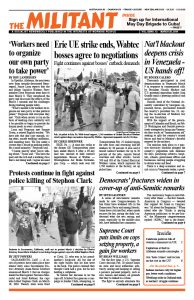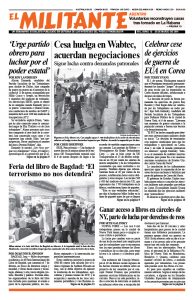For the first time, a U.S. Supreme Court decision Feb. 20 placed limits on state and local authorities arbitrarily seizing and keeping or selling a person’s personal property, such as cars, houses and money, on grounds that they’re linked to a crime.
The fight to entirely eliminate this rapacious practice, known as civil forfeiture, is part of defending workers’ rights.
The cops and prosecutors claim that these seizures only affect big drug traffickers and crime bosses, but that’s a lie. The case before the Supreme Court, for example, involved Tyson Timbs, a 37-year-old machinist from Marion, Indiana. He was arrested in 2013 for selling four grams of heroin for $385 to an undercover detective. After he was pressed to cop a plea bargain, Timbs was sentenced to one year of home detention followed by five years probation, and fined $1,200.
But state officials seized his $42,000 Land Rover, claiming — in the absence of any proof — he had used it to commit crimes. Timbs had bought the car with funds from his father’s life insurance policy after he passed away. The car was worth “more than four times the maximum $10,000 monetary fine assessable against him for his drug conviction,” Justice Ruth Bader Ginsburg wrote for the court.
Timbs sued the state of Indiana. A state trial and appellate court blocked forfeiture of the Land Rover, saying the Eighth Amendment to the U.S. Constitution forbids cruel and unusual punishments and excessive fines. The Indiana Supreme Court reinstated the seizure, arguing “states’ rights.” The limit on fines applied only to the federal government, the judges said.
In the Feb. 20 decision the U.S. Supreme Court overturned their ruling unanimously. The high court relied on the 14th Amendment to the Constitution, won out of the overthrow of slavery in the Civil War to prevent state governments from infringing on the rights of former slaves. It applies all protections guaranteed by the Bill of Rights to state governments.
“The protection against excessive fines has been a constant shield throughout Anglo-American history,” wrote Ginsburg. “Excessive fines can be used, for example, to retaliate against or chill the speech of political enemies.”
The fight continues
The ruling in the Timbs case is narrow. The justices sent it back to lower courts to decide whether the Land Rover’s seizure was an “excessive fine.”
The high court’s ruling, “does not mean state and federal authorities may no longer seek to seize property they suspect of being connected to a crime,” said a Feb. 21 Washington Post editorial. “The high court has not deemed that practice unconstitutional.”
Civil forfeitures have long been a profit boon for the cops at all levels. In 2018, state and local agencies took some $400 million worth of people’s possessions this way, according to the Justice Department. In Philadelphia, funds from forfeitures have at times accounted for 20 percent of the city prosecutors’ budget, while government and cop agencies in New York and California have seized even more.
There are numerous cases that show you don’t have to be convicted of anything, or even have criminal charges filed against you, to have your stuff seized. And to get back your property is all on you. Once it’s been confiscated, you have to be someone with the time and money to fight to win its return.
Many examples abound of how cop agencies have used civil forfeiture to steal money in attacks on workers’ rights. After a friend dropped waitress Brandy Cooke off at a sports bar in Myrtle Beach, South Carolina, “drug enforcement agents swarmed her in the parking lot and found $4,670 in the car” that belonged to her, reported the Greenville News. “Her friend was wanted in a drug distribution case, but Cooke wasn’t involved. She had no drugs and was never charged in the 2014 bust. Agents seized her money anyway.”
She had the cash because she didn’t have a checking account, and it took her over a year to get it back.
Commenting on regular “egregious” abuses of civil forfeiture, Justice Clarence Thomas wrote in 2017 of a case where police in the town of Tenaha, Texas, “regularly seized the property of out-of-town drivers passing through and collaborated with the district attorney to coerce them into signing waivers of their property rights.” Thomas pointed to one case where “they seized a Black plant worker’s car and all his property (including cash he planned to use for dental work), jailed him for a night, forced him to sign away his property, and then released him on the side of the road without a phone or money.”
Under the capitalist “justice” system, workers can face a vicious spiral of unpayable tickets, frame-ups, fines, fees and mounting debts. In Ferguson, Missouri, where Black teenager Michael Brown was killed by a cop in 2014, a Justice Department investigation of the police department found the city government depended on fines and other fees to cover operating expenses.
The fight to push back against these kinds of official theft is in the interests of working people.

